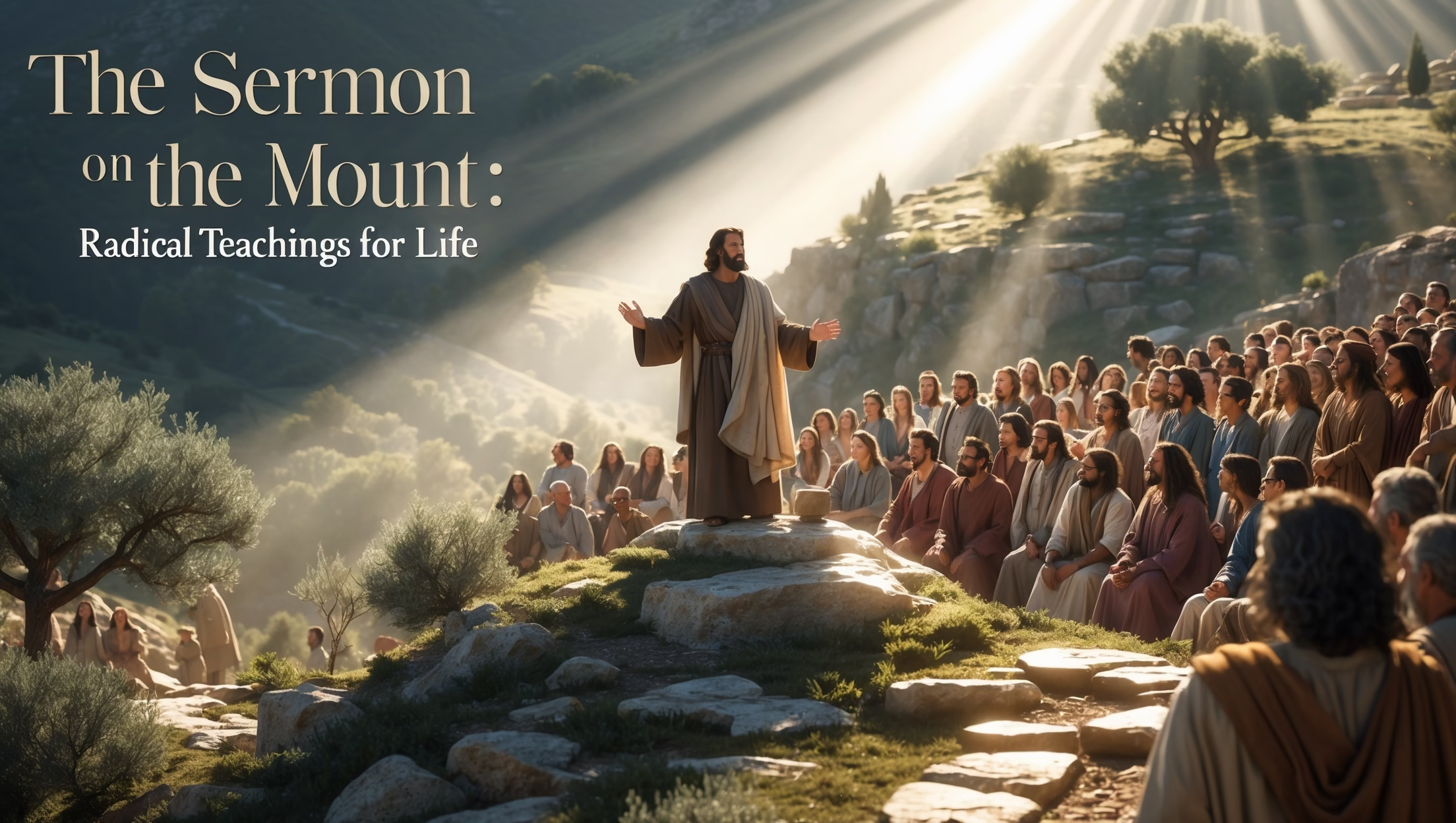Introduction
The Sermon on the Mount, recorded in Matthew 5–7, stands as one of the most profound and influential teachings of Jesus. It provides a comprehensive vision of God’s Kingdom and lays out the values, attitudes, and behaviors expected of those who follow Him. Far from being a set of abstract moral rules, the sermon calls for a transformation of the heart, encouraging believers to live in ways that contrast sharply with worldly norms. Through this teaching, Jesus challenges His followers to embrace humility, mercy, love, and integrity, demonstrating that Kingdom life is both countercultural and deeply practical.

The Beatitudes
Jesus opened the sermon with the Beatitudes, a series of blessings that describe the attitudes and character of those who belong to God’s Kingdom (Matthew 5:3–12). He blessed the poor in spirit, the meek, those who mourn, the merciful, the pure in heart, peacemakers, and those persecuted for righteousness. These statements overturn conventional ideas of success and power, revealing that God values humility, dependence on Him, and a heart aligned with divine purposes. Each beatitude points to both present comfort and future reward, offering hope to those marginalized or struggling. Through these teachings, Jesus demonstrates that Kingdom citizens are defined not by status or wealth, but by their spiritual posture and relationship with God.
Teaching on the Law
Jesus deepened and clarified the meaning of the Law, showing that God desires inner righteousness, not merely outward compliance. He taught that anger is akin to murder and that lustful thoughts are equivalent to adultery (Matthew 5:21–30). By focusing on the heart rather than superficial actions, Jesus calls His followers to pursue moral integrity, self-control, and reconciliation. His reinterpretation emphasizes that the Law is not a set of burdensome rules but a guide to cultivate love, justice, and holiness. In doing so, Jesus reveals that true obedience springs from transformation within, a reflection of God’s character in daily life.
Prayer, Fasting, and Giving
Spiritual disciplines such as prayer, fasting, and giving were central to Jesus’ teaching. He instructed His disciples to practice these acts with sincerity, avoiding hypocrisy and public showiness (Matthew 6:1–18). The Lord’s Prayer serves as a model for heartfelt devotion, focusing on honoring God’s name, seeking His kingdom, depending on Him for daily provision, seeking forgiveness, and requesting guidance and protection. Jesus’ approach underscores that spiritual practices are meant to cultivate intimacy with God, strengthen character, and express genuine love for Him, rather than earn approval from others.
Love for Enemies
One of the most radical aspects of the Sermon on the Mount is Jesus’ teaching on loving enemies and praying for persecutors (Matthew 5:43–48). This command challenges natural human instincts for revenge or resentment and calls for a reflection of God’s unconditional love. Loving those who oppose us demonstrates the transformative power of the Kingdom and serves as a witness to God’s mercy. By extending grace even to adversaries, believers participate in God’s restorative work, breaking cycles of hatred and promoting reconciliation. This teaching emphasizes that the values of the Kingdom are fundamentally relational and transformative, shaping how believers interact with the world around them.
Building on the Rock
Jesus concluded the sermon with a parable about building on a solid foundation (Matthew 7:24–27). Those who hear His words and put them into practice are likened to a wise builder constructing on rock, able to withstand storms and trials. Conversely, ignoring His teachings leads to instability and ruin. This metaphor highlights the importance of integrating faith with action, showing that Kingdom life requires both understanding and obedience. It encourages believers to anchor their lives in Christ’s teachings, ensuring resilience and spiritual growth amid life’s challenges.
Living the Sermon Today
The Sermon on the Mount remains profoundly relevant for modern believers. Its principles challenge cultural norms, calling for integrity, humility, compassion, and justice in everyday life. By applying these teachings, Christians can cultivate authentic relationships, pursue ethical decision-making, and embody the values of God’s Kingdom in both personal and public spheres. The sermon provides a blueprint for living faithfully in a world often driven by self-interest, offering guidance for navigating moral complexity while maintaining Christlike character.
Conclusion
The Sermon on the Mount is a radical call to Kingdom living. Jesus’ teachings on the Beatitudes, the Law, prayer, love for enemies, and obedience provide a transformative framework for life. They invite believers to live with integrity, humility, and love, embodying the values of God’s Kingdom in a broken world. By following this blueprint, Christians can experience spiritual growth, reflect God’s character, and become a witness of His mercy and justice to all around them.








